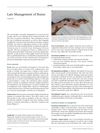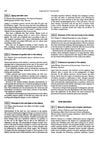 51 citations,
November 2005 in “Journal of Medical Primatology”
51 citations,
November 2005 in “Journal of Medical Primatology” Alopecia in captive rhesus macaques is affected by season, sex, age, housing, and stress, with complex links between stress hormones and hair loss.

Topical minoxidil helps treat hair loss in teens, but more research needed for safe options.
 June 2002 in “Surgery (oxford)”
June 2002 in “Surgery (oxford)” The document says that treating burns late focuses on improving function, appearance, and helping patients return to normal life, using both non-surgical and surgical methods.
 159 citations,
September 2001 in “European Journal of Cancer Care”
159 citations,
September 2001 in “European Journal of Cancer Care” Chemotherapy-induced hair loss significantly affects patients' well-being, and nurses are key in helping them cope, but more research is needed to find effective treatments.
3 citations,
November 2021 in “Stress” Girls had higher stress hormone levels during school due to social and emotional issues, while boys had higher overall hormone levels with slight changes when school started.
14 citations,
May 2017 in “InTech eBooks” Hair is important for protection, social interaction, and temperature control, and is made of a growth cycle-influenced follicle and a complex shaft.
 December 2019 in “Buletin de psihiatrie integrativă”
December 2019 in “Buletin de psihiatrie integrativă” Skin treatments can improve both skin health and emotional well-being, but they require careful management of patient expectations and potential addiction risks.
 September 1998 in “Journal of The European Academy of Dermatology and Venereology”
September 1998 in “Journal of The European Academy of Dermatology and Venereology” Old people's nails often have problems due to body changes, more diseases, and self-care difficulties, affecting their movement and hand use.
82 citations,
May 2010 in “PLoS neglected tropical diseases” Secondary syphilis in Cali, Colombia, shows high Treponema pallidum presence and challenges in early diagnosis, needing better public health strategies.
 3 citations,
June 1999 in “Seminars in Cutaneous Medicine and Surgery”
3 citations,
June 1999 in “Seminars in Cutaneous Medicine and Surgery” Hair transplantation can effectively treat female pattern hair loss with the right patient selection and surgical skill.
 June 2023 in “Buletin de psihiatrie integrativă”
June 2023 in “Buletin de psihiatrie integrativă” Alopecia causes significant emotional distress and psychological issues, requiring combined skin and mental health treatment.
 November 2018 in “The Journal of Allergy and Clinical Immunology: In Practice”
November 2018 in “The Journal of Allergy and Clinical Immunology: In Practice” Using old drugs for new uses can help treat rare immune deficiencies.
 September 2003 in “Current Paediatrics”
September 2003 in “Current Paediatrics” The document concludes that accurate diagnosis and understanding the type of hair disorder are crucial for treating hair loss in children.
 210 citations,
November 2015 in “The Lancet HIV”
210 citations,
November 2015 in “The Lancet HIV” PrEP for HIV is less effective in transgender women mainly due to low adherence to the treatment.
 85 citations,
July 2012 in “Cold Spring Harbor perspectives in biology”
85 citations,
July 2012 in “Cold Spring Harbor perspectives in biology” The skin protects the body and is constantly renewed by stem cells; disruptions can lead to cancer.
 66 citations,
December 2003 in “Endocrinology and Metabolism Clinics of North America”
66 citations,
December 2003 in “Endocrinology and Metabolism Clinics of North America” Doctors need to be better prepared to assess and treat obesity in patients.
 62 citations,
September 1974 in “Academy of Management Journal”
62 citations,
September 1974 in “Academy of Management Journal” Karl E. Weick suggested focusing on everyday events and smaller groups to improve organizational theory and urged the inclusion of nonobvious aspects for better explanations.
 37 citations,
July 2010 in “International Journal of Trichology”
37 citations,
July 2010 in “International Journal of Trichology” Hair loss affects quality of life, self-esteem, and confidence, but younger patients cope better.
 2 citations,
July 2011 in “Journal of the Egyptian Women's Dermatologic Society (Print)”
2 citations,
July 2011 in “Journal of the Egyptian Women's Dermatologic Society (Print)” Eating nuts, chocolate candy, and red tea might worsen acne, while eating more fresh vegetables could reduce it.
 2 citations,
January 1979 in “Yearbook of English studies”
2 citations,
January 1979 in “Yearbook of English studies” Nineteenth-century British drama closely reflected the era's societal values and concerns.
 July 2021 in “European Journal of Plastic Surgery”
July 2021 in “European Journal of Plastic Surgery” Modern society values both traditional beauty and imperfections, but media pressures lead to more cosmetic enhancements and ethical concerns.
 June 2007 in “Journal of The Royal Society for The Promotion of Health”
June 2007 in “Journal of The Royal Society for The Promotion of Health” Smoking doubles the risk of blindness, and physical exercise helps dyslexic children read better.
 23 citations,
January 1997 in “Computers and Composition”
23 citations,
January 1997 in “Computers and Composition” To stop online sexism, both men and women need to change how they act.
1 citations,
January 2021 in “Clinical dermatology review” Severe hair loss significantly worsens quality of life.
1 citations,
January 2022 in “Dermatology Research and Practice” Androgenetic alopecia negatively affects self-esteem and daily stress, especially in young men.

Some TikTok hair loss remedies like rosemary oil, onion juice, and garlic gel show promise, but more research is needed and they might delay proper treatment.
24 citations,
June 2020 in “Journal of the American Academy of Dermatology” Patients reduced searches for dermatology issues during COVID-19, indicating a need for better telehealth services.
 3 citations,
May 2018 in “Journal of nutritional health & food science”
3 citations,
May 2018 in “Journal of nutritional health & food science” Nutritional supplements can help manage hair loss and promote hair growth by strengthening hair roots and countering harmful effects of pollution, smoking, and deficiencies in vitamins and minerals.
October 2020 in “M/C Journal” Society's view of "freaks" has shifted from natural deformities to extreme plastic surgery, reflecting changing beauty standards and pressures.
 September 2024 in “Journal of Cutaneous and Aesthetic Surgery”
September 2024 in “Journal of Cutaneous and Aesthetic Surgery” A young man with severe neck and beard burns was successfully treated, restoring neck movement and improving skin appearance.






















